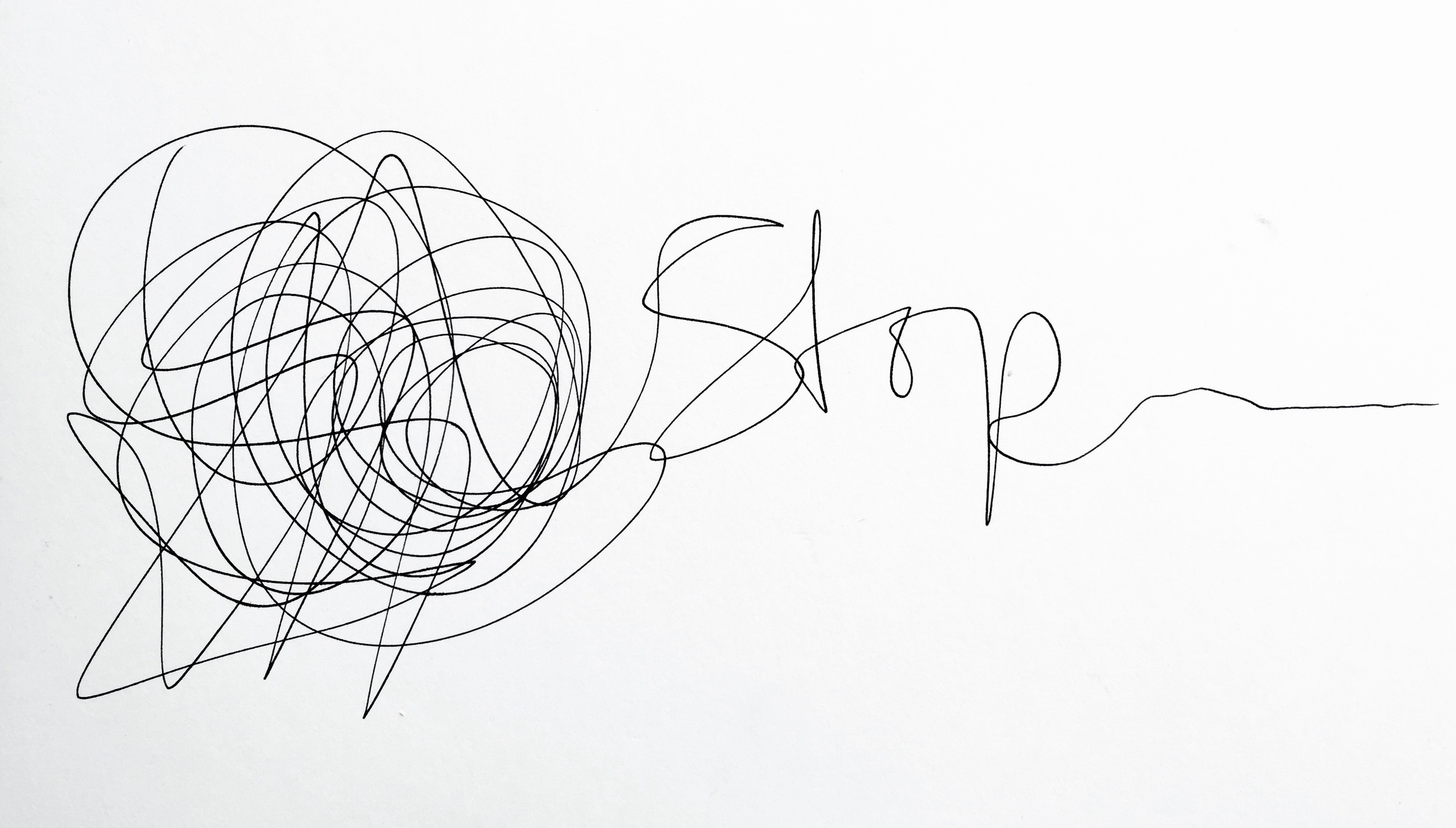How to Stop
/
I’d like to share with you the story of John.
John has not stopped for a long time. He’s always on the go.
After graduating he went from one job to the next. Eventually landing a well-paid corporate job, he worked hard and saved for a home.
He got married, but that didn’t last more than 3 years. After the divorce, he decided to quit his job, sold his home and travelled the world. He kept searching for something - happiness I suppose, but he didn’t say it.
Returning home, he found himself another job in the same field, but a smaller company. He’s now working away, building up his capital, to buy another house…maybe get married again….you get the picture.
If you look at your own life, it may not be that dissimilar. You may be busy working away, to achieve your next ‘thing’ - whether that’s a home, partner, job or whatever else. In itself, the next thing is fine. But is there a time to ever stop this striving? And how could that possibly help?
This digital age could also be called the anxiety age. When people keep rushing on and on, anxiety is the end result. I define rushing and busyness as the opposite of stopping.
Constantly running, striving, seeking to achieve this or that. Chasing whatever it may be - from money, love or peace and happiness.
The seeking keeps you as a seeker. Although the old quote ‘seek and you shall find’, I’d say it’s more like ‘seek and you shall keep seeking’. Stopping is the answer.
Levels of stopping
There’s two aspects to stopping - physical and mental. The most important is mentally stopping, as that leads to physically stopping. But they can feed into each other too.
Physical Level - One way to calm your mind down is to reduce how much you move around. The more you begin to still your body, the more you begin to still your mind. But as you may be rushing around a lot, practises like yoga can help you to gradually come to a stop.
Alternatives can be walking that you begin at your normal pace and gradually slow down. Or other mind body practices like tai chi, qigong and the like.
Mental Level - Your mind can stop. I know many mindfulness teachers disagree. But I have experienced it and so have many other teachers.
Your mind can become so calm and quiet, that even a single thought ceases to arise. In fact, it’s the nature of the mind to be calm and still. You disturb the mind through desire..through wanting.
As the Buddha said, suffering (unhappiness) is due to attachment (wanting). And then he said to eliminate suffering (to be happy) let go of clinging (wanting).
To let go of wanting means to be content with what is. So effectively the Buddha was teaching, be happy by being content with things as they are.
That’s what true stopping is about - contentment.
Why Stop?
From doing to being mode
Doing is also the opposite of stopping. Doing is about striving and achieving. And obviously you need to do stuff! You’re not gonna get much done by simply chilling out all the time. And sometimes stuff needs doing. Kids do need feeding…and more importantly, need loving. Bills need paying. And text messages need answering.
But…too much doing all the time wears you out…you get tired. There are times when you don’t need to do anything, and yet, you keep going. The momentum of the all the busyness keeps you moving.
Most people think mindfulness develops through will power. That’s actually not true. Experiment with this yourself. Will power can only last so long. Mindfulness actually develops naturally through non-doing. When you stop being so busy, the mental energy that you normally use into getting stuff done, starts pouring into mindfulness. You notice more.
As you begin to grow in mindfulness, sadness and anxiety reduce. Depression is partly due to low levels of mindfulness. As you begin to do less, your energy levels begin to return and you don’t feel so depressed anymore. You begin to notice the good stuff. And with less doing and more being, anxiety goes down too.
More peace and happiness
Mindfulness leads to the (almost) ultimate stop.
My nature is to be busy. I’m often thinking about ‘what next?’ Eventually this lead me to working too hard. And then I sought out an antidote. Meditation was the solution. The ultimate stopping. Whilst you’re still alive anyway! At some points in my career as a teacher, I was so busy, there was hardly any time to sleep! Lack of sleep led to lack of efficiency. I took longer to get the work done. That meant even less sleep. More tiredness led to impatience at work. Frustration with the job. And the cycle would have spiralled out of control if it wasn’t for holidays and knowing how to stop. This negative cycle happens to so many people - probably has happened to you too.
How to Stop?
1. Really enjoy the stop
As I write these words, I’m in a very special place. I’m sitting on a balcony overlooking a beautiful lake near Orlando in Florida. A nice place to stop. And yet, I easily find myself busy doing one thing or the other.
Stopping needs to be seen as a good thing in your mind. And to your mind. Stopping is something to look forward to - not to dread. Many people, me included in the past, sometimes think of meditation as a chore - something you have to do for your health and wellbeing.
Flip it! Instead, see stopping as a real joy. A treat. Like chocolate or a nice dinner or a nice massage. Meditation is to be enjoyed as a pleasure. There’s nothing wrong with that. In fact, putting joy into meditation is what I’m all about.
2. Change your company: Digital Distractors or Mindful Monks?
I spent some time with colleagues at a fast growing startup in London. Now, most of their friends are kinda hyperactive! They don’t stop. Ever. Always on the phone, texting, checking emailing every few minutes…and even when they don’t really have much to do, they’ll find some new app to explore with on their phone.
I find if I spend too much time with agitated people like that, I start to get agitated more quickly. I’m checking my phone more. I’m walking fast and speaking faster.
I find that the company I keep makes me stop more…or less.
When I was on a retreat, spending time with monks and other retreat participants, the opposite was true. Life slowed down and was more peaceful.
So, chose your friends carefully. If you easily get anxious, too stressed or low, spend time with people that meditate or that are generally good for you. You know the type - nice people.
Mix with everyone of course, but choose the people you spend most time with, wisely.
3. Take Micro stops
I just stopped for one full in and out breath. Before I wrote this paragraph. The short stop made me drop my shoulders. And that started off a little chain reaction. I then adjusted my posture. Smiled more. Made myself more comfortable. And stopped again. Can you see how a micro stop can set off a chain reaction of positivity? I hope so! Why not try a micro stop right now - just for a breath or two?
4. Get back to the fundamentals
In my 17 years or so meditating, I’ve found one way that’s more powerful than any other for calming the mind. And here it is: let the mind go.
Controlling the mind, trying to make it silent has the opposite effect. But when you stop controlling, let the mind wander as it wishes and just sit back and watch…magic happens. First of all the mind keeps wandering, but eventually it comes back. The mind stills. And you enter into a very powerful and peaceful state of mind. Energising, uplifting and unforgettable.
If this sound impossible or unattainable, please don’t fret. Join our email list if you haven’t already, and I’ll keep offering mindfulness, compassion, wisdom and wellbeing tips and sharing stories to help you happiness. I’m here to help you.
What's your tips? How do you stop? Let's chat below!



